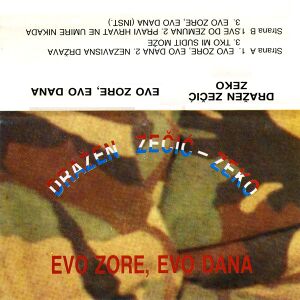Evo zore, evo dana
Evo zore, evo dana (lit. Here comes the dawn, here comes the day) is the second studio album and the first war-time album of Croatian singer-songwriter Dražen Zečić, coming out in February 1992.
| Evo zore, evo dana | ||||
|---|---|---|---|---|
 | ||||
| Studio album by Dražen Zečić - Zeko | ||||
| Released | February 1992 | |||
| Genre | Pop, Brass | |||
| Label | Self release | |||
| Dražen Zečić - Zeko chronology | ||||
| ||||
Background
In April 1990, Dražen Zečić released his first album named ''Zagrli me noćas jače'' for the label Suzy. However, he would have to pause his singing career in mid 1991, when he joined the Croatian army at the start of the war. He was a member of the 1st Battalion of the 4th Guards Brigade, in the third company, third platoon(Foka Fighters), made up of soldiers from the community of Mjesni from Split III.[1] He would see action on the Zadar and Drniš battlefields. These experiences would make him write patriotic songs. He would often perform for his company and his comrades would help him write some of these songs[1]. One of the earlier songs was ''Pravi Hrvat ne umire nikada'', mentioned in an article on the 13th of January 1992[1]. On the 8th of February 1992, the soldiers of the 4rd brigade would undergo a military test together with footballers from Hajduk Split on the Poljud stadium. At that event Zečić, accompanied by the Split group Aspalathos Brass, would perform a small concert. There he presented for the first time the songs ''Sve do Zemuna'' and ''Nezavisna država'', written at the front together with soldiers of his platoon.[2]
Release
Around that time in February, the tape entitled Evo zore, evo dana would come out. It contained 5 patriotic songs and an instrumental of the title track at the end. The title track was one of many modern adaptations of the WW2 ustaša march by the same name, While not the first version made at that time, it was the most was the most popular during the war. The album also contained the other songs written at the front: ''Nezavisna država'', ''Sve do Zemuna'' and ''Pravi Hrvat ne umire nikada''. The other song included was named ''Tko Mi Sudit Može'', and it was supposed to be sung at the Split '91 festival of patriotic songs ''Lijepa naša'', edition which never took place because of the war. All the songs were written and arranged in Split by Dražen Zečić, the album being a self release.
Popularity
The songs would be briefly played on major radio stations in February-March 1992, despite the politically incorrect subject matters. The songs, despite their brief popularity on radio, would get big with the general public. Throughout the whole duration of the war, even after a breakthrough in his pop career, Zečić would perform his patriotic songs to great public acclaim. After the end of the war, the songs would not be performed anymore, with the exception of Pravi Hrvat ne umire nikada, the non-offensive song of the album, which is performed even today.
Track listing and credits
Music, lyrics, arrangements: Dražen Zečić
Side A
| No. | Title | Lyrics | Music | Length |
|---|---|---|---|---|
| 1. | "Evo zore, evo dana" | traditional (adapted by Dražen Zečić) | traditional | |
| 2. | "Nezavisna Država" | |||
| 3. | "Tko mi sudit može" (Split '91) |
Side B
| No. | Title | Length |
|---|---|---|
| 1. | "Sve do Zemuna" | |
| 2. | "Pravi Hrvat ne umire nikada" | |
| 3. | "Evo zore, evo dana (inst.)" |
>>... ova kaseta namijenjena je svim mojim suborcima i svim braniteljima Lijepe naše u njenim povijesnim granicama...<<
Autor
NEKA BOG ČUVA SVE PRAVE I ISKRENE HRVATE
>>... this cassette is dedicated to all of my comrades and defenders of our beautiful (homeland) in its historical borders ...<<
Author
MAY GOD PROTECT ALL TRUE AND HONEST CROATS